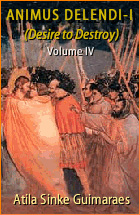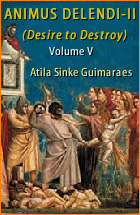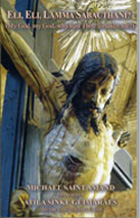About the Church
 |
 |
 |
 |
 |
 |
 |
The Great Lesson of Easter: Christus Resurrexit!
The various cycles of the Liturgical Year follow one another with regularity in the Church's calendar, undisturbed in their succession, no matter how much the events of human history vary around them, despite the ups and downs of politics and finances that follow their disorderly course. It is an affirmation of the heavenly majesty of the Church, who towers above the capricious vacillations of human passions.
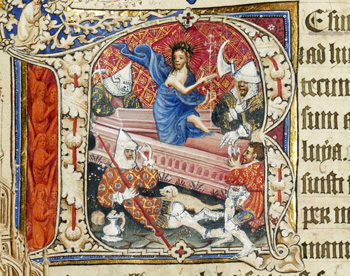 Above, but not indifferent to them. When the sorrowful days of Holy Week pass in tranquil and happy periods of history, the Church, like a solicitous Mother, takes advantage of them to revive in her children self-denial, the sense of heroic suffering, a spirit of renouncing everyday trivialities, and a total devotion to ideals that give life a higher meaning. A “higher meaning” is not quite the correct expression. It is the only meaning that life has: the Catholic meaning.
Above, but not indifferent to them. When the sorrowful days of Holy Week pass in tranquil and happy periods of history, the Church, like a solicitous Mother, takes advantage of them to revive in her children self-denial, the sense of heroic suffering, a spirit of renouncing everyday trivialities, and a total devotion to ideals that give life a higher meaning. A “higher meaning” is not quite the correct expression. It is the only meaning that life has: the Catholic meaning.
But the Church is not just a Mother when she teaches us the grand austere mission of suffering. She also is a Mother when, in the extremes of sorrow and annihilation, she makes the light of Christian hope shine before our eyes, opening before us the serene horizons that the virtue of confidence puts before the eyes of all true children of God.
Thus, even amidst the sadness of our present situation, the Holy Church avails herself of the vibrant and chaste joys of Easter to shine before our eyes the triumphant certainty that God is the supreme Lord of all things, that His Christ is the King of Glory Who conquered death and smashed the Devil, that His Church is a Queen of immense majesty, capable of rising from the rubble, dispelling the darkness, and shining with a more resplendent triumph at the precise moment when the most terrible and irremediable of defeats seemed to await her.
*
The joy and sorrow of the soul necessarily result of love. Man rejoices when he has what he loves, and grieves when what he loves is missing.
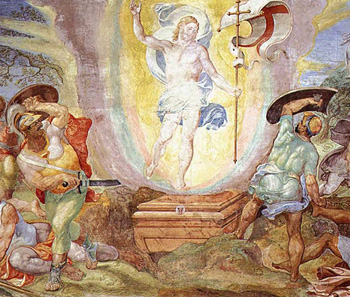 Contemporary man pours all his love into superficial things and, therefore, only superficial events move him, even the smallest thing pertaining to his tiny person. Thus, he is moved above all by his personal and superficial misfortunes: his poor health, his unstable financial situation, his ungrateful friends, his delayed promotion, etc. In fact, however, all this is secondary for the true Catholic who cares above all for the greater glory of God and, therefore, for the salvation of his soul and the exaltation of the Church.
Contemporary man pours all his love into superficial things and, therefore, only superficial events move him, even the smallest thing pertaining to his tiny person. Thus, he is moved above all by his personal and superficial misfortunes: his poor health, his unstable financial situation, his ungrateful friends, his delayed promotion, etc. In fact, however, all this is secondary for the true Catholic who cares above all for the greater glory of God and, therefore, for the salvation of his soul and the exaltation of the Church.
For this reason, the greatest suffering of the Catholic should be to contemplate the Church in her present condition.
Undoubtedly this situation has its consolations. However, it would be an error to deny that the general apostasy of nations is going forward with a frightening crescendo; that the tendency towards paganism is rapidly developing in heretical or schismatic nations that have still conserved some traces of Christian substance. In the Catholic ranks themselves, alongside a promising renaissance, one can observe the progressive march of neo-paganism: Customs are depraved, families are small, protestant and spiritualist sects are proliferating.
Despite so many reasons for sadness, reasons that seem to portend for the entire world a catastrophe that is not far off, Christian hope continues. And the reason for this is taught to us by the feast of Easter itself.
*
When Our Lord Jesus Christ died, the Jews sealed His Tomb, garrisoned it with soldiers and thought the matter had ended.
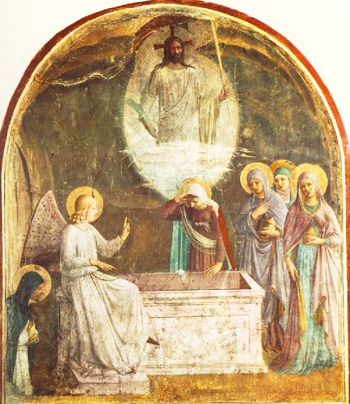 In their impiety, they denied that Our Lord was the Son of God, that He was capable of destroying the sepulchral prison in which He laid, and most of all, that He was capable of passing from death to life. Now then, all this happened. Our Lord rose again without any human assistance, and by His command the heavy stone of the tomb moved away quickly and lightly, like a cloud. And He rose from the dead.
In their impiety, they denied that Our Lord was the Son of God, that He was capable of destroying the sepulchral prison in which He laid, and most of all, that He was capable of passing from death to life. Now then, all this happened. Our Lord rose again without any human assistance, and by His command the heavy stone of the tomb moved away quickly and lightly, like a cloud. And He rose from the dead.
Likewise, the immortal Church can also be apparently abandoned, ruined and persecuted. She may lie on the ground, defeated in appearance under the sepulchral weight of the heaviest trials. But she has within herself an inner supernatural strength, which comes to her from God and which assures her of a victory that is all the more splendid as it is unexpected.
This is the great lesson of Easter, the great consolation for upright men who love the Church of God above all: Christ died and rose again.
The immortal Church rises from her trials, glorious like Christ in the radiant dawn of His Resurrection.


The triumph of Christ’s Redemption always appears in the Liturgical Year
But the Church is not just a Mother when she teaches us the grand austere mission of suffering. She also is a Mother when, in the extremes of sorrow and annihilation, she makes the light of Christian hope shine before our eyes, opening before us the serene horizons that the virtue of confidence puts before the eyes of all true children of God.
Thus, even amidst the sadness of our present situation, the Holy Church avails herself of the vibrant and chaste joys of Easter to shine before our eyes the triumphant certainty that God is the supreme Lord of all things, that His Christ is the King of Glory Who conquered death and smashed the Devil, that His Church is a Queen of immense majesty, capable of rising from the rubble, dispelling the darkness, and shining with a more resplendent triumph at the precise moment when the most terrible and irremediable of defeats seemed to await her.
The joy and sorrow of the soul necessarily result of love. Man rejoices when he has what he loves, and grieves when what he loves is missing.

The Resurrected Christ blinds the Roman socldiers who flee in panic
For this reason, the greatest suffering of the Catholic should be to contemplate the Church in her present condition.
Undoubtedly this situation has its consolations. However, it would be an error to deny that the general apostasy of nations is going forward with a frightening crescendo; that the tendency towards paganism is rapidly developing in heretical or schismatic nations that have still conserved some traces of Christian substance. In the Catholic ranks themselves, alongside a promising renaissance, one can observe the progressive march of neo-paganism: Customs are depraved, families are small, protestant and spiritualist sects are proliferating.
Despite so many reasons for sadness, reasons that seem to portend for the entire world a catastrophe that is not far off, Christian hope continues. And the reason for this is taught to us by the feast of Easter itself.
When Our Lord Jesus Christ died, the Jews sealed His Tomb, garrisoned it with soldiers and thought the matter had ended.

Christ was not resurrected; He rose Himself & conquered death for mankind
Likewise, the immortal Church can also be apparently abandoned, ruined and persecuted. She may lie on the ground, defeated in appearance under the sepulchral weight of the heaviest trials. But she has within herself an inner supernatural strength, which comes to her from God and which assures her of a victory that is all the more splendid as it is unexpected.
This is the great lesson of Easter, the great consolation for upright men who love the Church of God above all: Christ died and rose again.
The immortal Church rises from her trials, glorious like Christ in the radiant dawn of His Resurrection.

O Legionário, nº 660, April 1, 1945
Posted on April 3, 2024
Posted on April 3, 2024






